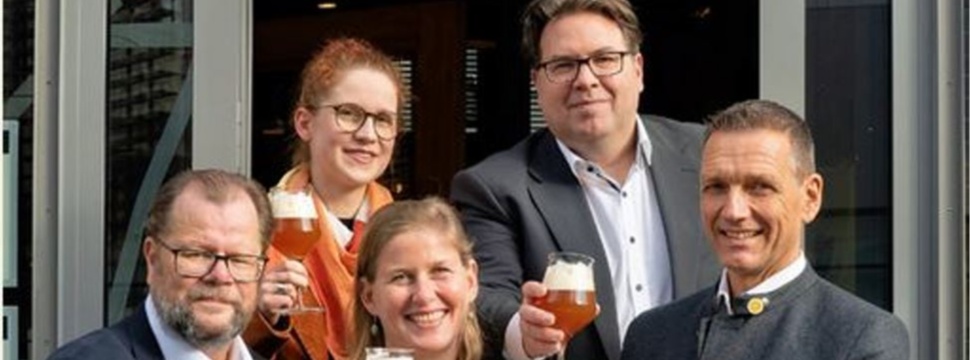Sommelier training and hobby brewing are in vogue - Energy crisis weighs on German brewing industry - Beer sales catch up in 2022, but breweries remain under pressure
News General news
German Brewers Association and Beer Sommeliers Association inform in Berlin

The German Brewers Association (DBB) and the Association of Beer Sommeliers (VDBS) informed about the current situation of the brewing industry, the growing success of sommelier training and the nationwide trend towards hobby brewing at a joint press conference in Berlin.
The DBB stated that it expects closures and a further decline in production as a result of the current energy crisis. As General Manager Holger Eichele said, the situation for the brewing industry has dramatically worsened.
"If the federal and state governments do not soon succeed in quickly and effectively limiting the prices for gas and electricity, many businesses in the manufacturing sector will not live to see the turn of the year," Eichele said. The Corona pandemic had triggered an unprecedented sales crisis in the past two years, which the industry had largely survived without exiting the market, but the financial and structural consequences of which many breweries were still far from over. "After this sales crisis, our companies are now additionally bracing themselves against the consequences of the energy crisis, the actual dimension of which can only be guessed at. 2022 will be one of the darkest years in our history, and the outlook for 2023 is unfortunately bleak."
According to the DBB, beer sales in Germany have stabilised surprisingly recently, but this cannot hide the extent of the energy crisis, in which more and more companies are making heavy losses. After the extremely poor months of June and July, sales in August 2022 had made a strong recovery with growth of almost 12 per cent compared to the previous year, even exceeding the figure for August 2019. Viewed over the year to date, however, total beer sales were 350 million litres below the figures for 2019, meaning that the German beer market had lost the volume of a large brewery in the last three years. According to the DBB, there is no sign of a trend reversal for the time being.
The most popular type of beer among Germans is still the Pilsner, with a market share of around 50 per cent. Recently, Helle beer has experienced significant growth, with sales increasing by 14 per cent last year alone, according to industry estimates. With a market share of a good 9 per cent, this variety, which until now has been mainly found in the south of Germany, is already in second place among the most popular German beers. Third place in retail is occupied by non-alcoholic beers (7 percent), closely followed by beer mixes in fourth place, also with 7 percent, and wheat in fifth place with a market share of 6 percent. Market research also shows that regional specialities such as country beers, sour beers or cellar beers, some of which are based on old or newly interpreted recipes, are rising in favour with consumers. But especially non-alcoholic beers and non-alcoholic mixed beer drinks have become increasingly popular in recent years. Germany's brewers are world leaders in the production of high-quality non-alcoholic beers. Since 2007, the production of non-alcoholic beer varieties in Germany has more than doubled - to a good 680 million litres in 2021. "Soon, every tenth beer brewed in Germany will be non-alcoholic," says DBB Chief Executive Holger Eichele.
Against the backdrop of the current crisis, the DBB welcomed as an "important signal" that beer brewing has been included as an Intangible Cultural Heritage in Germany on the corresponding UNESCO list. At the request of the German Brewers' Association and other organisations, and on the recommendation of the Expert Committee of the German UNESCO Commission, the Conference of Ministers of Education and Cultural Affairs of the Länder and the Federal Government Commissioner for Culture and the Media in the Chancellor's Office had decided to include the German art of brewing in the nationwide list. The UNESCO committee of experts paid tribute to craft beer brewing because it has proven to be "very versatile", especially in recent years. The excellent networking of German brewers among themselves, the regional roots of beer brewing and the numerous professional contacts abroad were also to be positively highlighted. For the brewers, this recognition was "an incentive to preserve the craft and to develop it further", Eichele said and thanked all the supporters of the initiative.
The Association of Graduate Beer Sommeliers, founded in 2005, had also supported the application of the German breweries. The president of the association, Christoph Kämpf from Straubing, explained in Berlin that hardly any craft has such a long history and rich culture, is so diverse and is held in such high esteem worldwide as the craft of brewing: "Beer, a transmission belt of social communication for thousands of years, was in danger of becoming an interchangeable product. The fact that craft brewing has survived in such diversity in German-speaking countries is thanks to brewers who not only pass on their knowledge over generations, but also their enthusiasm for beer as a cultural asset," says Kämpf. The training to become a beer sommelier is still a relatively young profession, he said, but one that is increasingly coming into focus in the public perception. The movement of beer sommeliers is growing from year to year and is flanked by an increasing appreciation for the art of brewing and quality beers. With their expertise, beer sommeliers ensure that beer knowledge and beer culture are promoted. The German Brewers Association has actively supported the beer sommelier movement for many years.
The Association of Graduate Beer Sommeliers has developed into a strong professional association with currently over 1,700 members. Strikingly, more and more women are taking the courses and enriching the beer world as sommeliers. "When it comes to beer, the focus automatically falls on men. This is because the world of mankind's oldest cultural beverage is considered a male domain," says Nicola Buchner, Managing Director of the VDBS. "Currently, however, the terrain is increasingly being conquered by women who work as brewers and beer sommeliers." Currently, 629 beer sommeliers are organised in the association, which corresponds to 37 percent women. In the founding years (2005-2008), only seven per cent women joined the association each year. The proportion of new members is currently 42 per cent.
The first female beer sommelier world champion in 2019 was Elisa Raus from Stralsund, who held her own against the mostly male competition in Rimini, Italy. "For many women who deal with the cultural asset of beer professionally or as a hobby, enjoyment and beer diversity are in the foreground," says Nicola Buchner. At tastings, she says, it can be observed that women are much more willing to experiment than men. They get excited about new beer styles more quickly and are more open to new flavour profiles.
Not only sommelier training is in vogue, but also hobby brewing: Wiebke Melcher from Hamburg has been brewing beer in her spare time for eight years. It all started with the motivation to find out how beer brewing works with common household objects, Melcher reported, who was given a brewing course as a gift by her husband at the time. Since then, they have been passionate about brewing. They brew in their kitchen at home, initially in a waking pot, but now a 50-litre stainless steel pot is both a lauter tun and a brewhouse. There are almost no limits to creativity in hobby brewing, says Wiebke Melcher, who even came third at the first German Hobby Brewers' Championship in 2017 with her "Heller Bock". "There is now a large network of hobby brewers in Germany - they are all united by their passion for beer and brewing."










